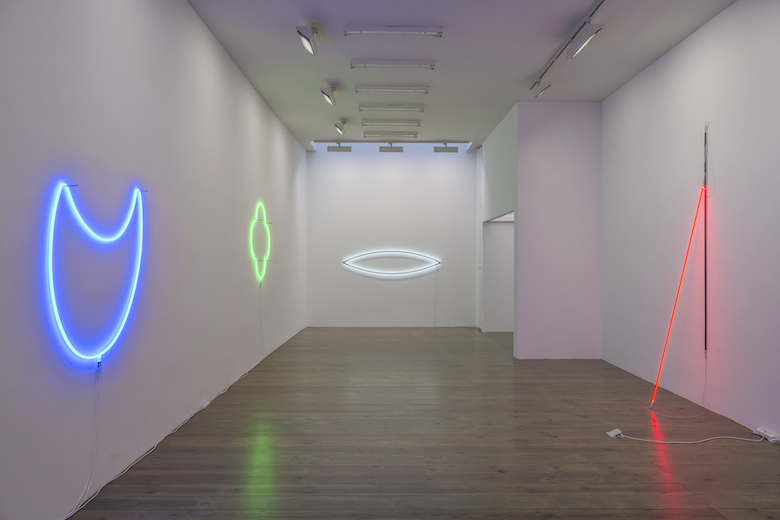
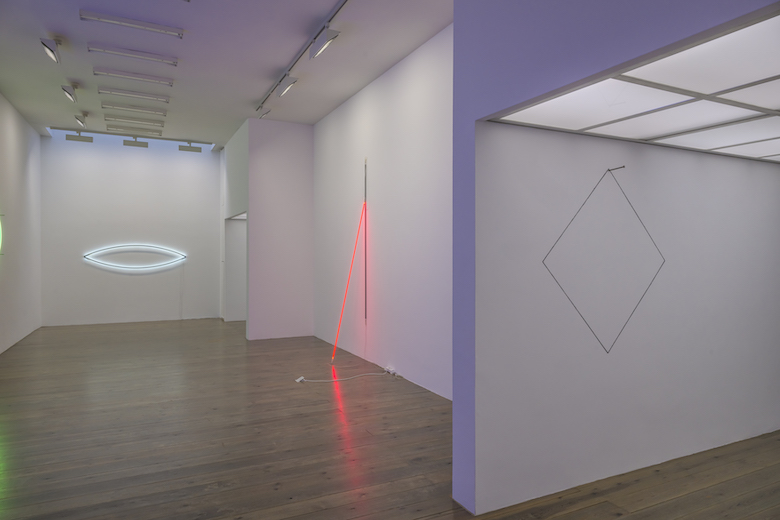
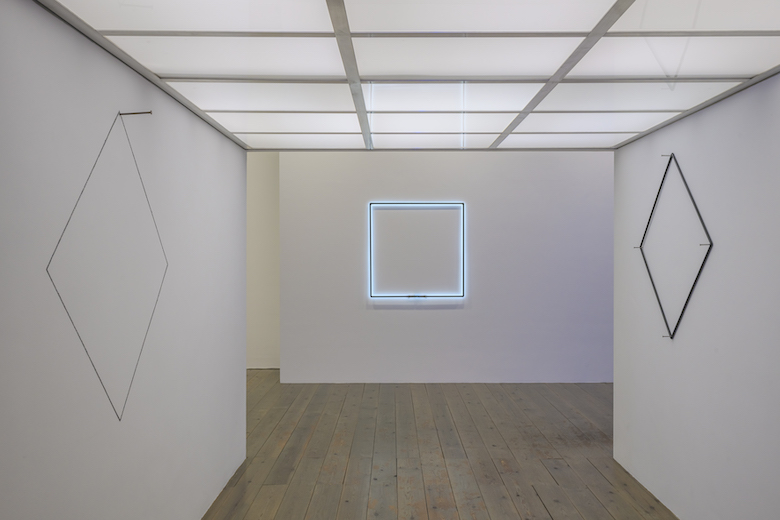
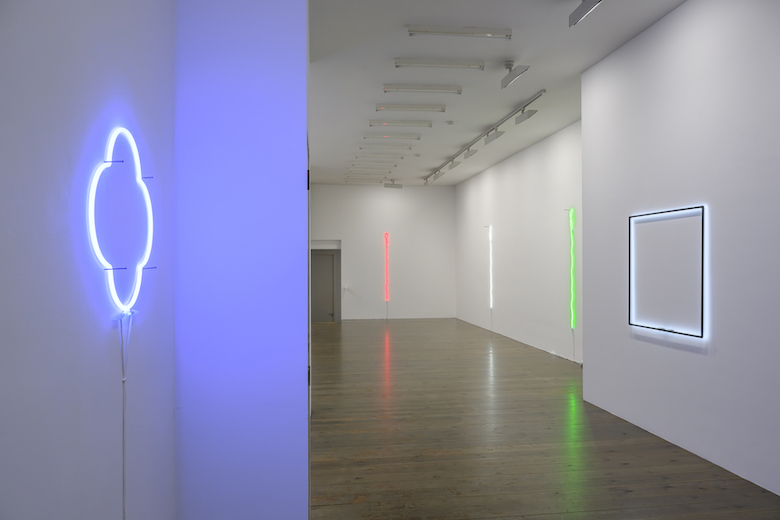
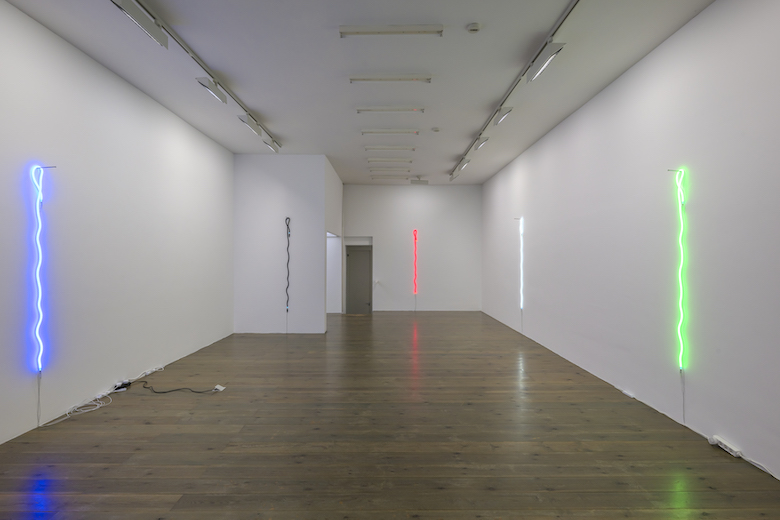


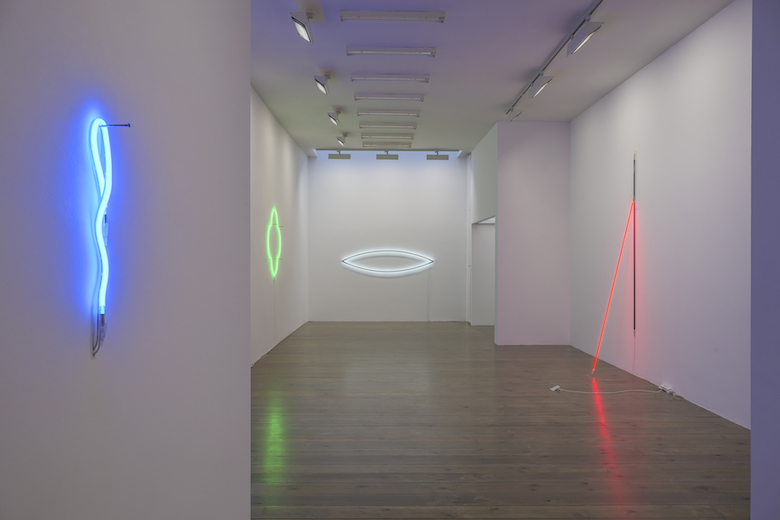
Slewe Gallery is pleased to host the exhibition But the Energy Continues by Dutch artist Jan van Munster (1939-2024). Van Munster is known for his impressive oeuvre of minimal geometric sculptures visualizing the phenomena of energy. In the exhibition his last light works will be shown in relation to some early light works from the seventies. It will be his second solo show at Slewe Gallery. The exhibition will be extended until February 1.
Jan van Munster was one of the most remarkable and influential artists of his generation in the Netherlands. He worked with various sources of energy, such as cold and heat, light and electricity or magnetism. His work is about contrasts, positive-negative, light-dark or warm-cold. In addition to a strong physical element, they also show spiritual powers as a metaphor for life. In the sixties his career started showing along with other famous artists as Ad Dekkers, Peter Struycken and Marinus Boezem. In these years Van Munster worked with traditional materials, such as marble, stone, iron and steel, but since the seventies he started to use polyester, granite, mercury and neon tubes as materials to load with energy. In the same period, he made films of his performances, in which he used his own body to show energy. Recently he translated his brain-activities into neon sculptures.
Over the years Jan van Munster created a unique art domain around a water tower at the peninsula of Walcheren in Zeeland. It was a place for living, producing art and showing the works in an ideal context. His works can be found in many cities in the Netherlands and Germany, in important private and public collections, such as the Van Abbe Museum, Eindhoven, Stedelijk Museum Amsterdam, Kröller-Müller Museum, Otterlo, Museum Boijmans, Rotterdam, Voorlinden Museum, Wassenaar, amongst others. He received various art prizes, such as recently the German Light Art Award (Deutsche Lichtkunstpreis), for which he had an exhibition at Kunstmuseum Celle in Spring 2020.
Slewe Gallery is pleased to announce the opening of the exhibition (Fe)Male by Karel Appel (1921-2006), one of the most important Dutch artists of the second half of the twentieth century. The exhibition features eight of Appel’s Nude paintings from the years 1994 and 1995. It opens on October 12 and will be on view until November 16. With this exhibition, Slewe Gallery celebrates its 30th anniversary.
The female and male figures featured in these paintings by Karel Appel emerge from a background of rough, loose streaks of oil paint. They have been painted masterfully in a wet-on-wet technique and are given as an expression bold confidence. The colorful brush strokes with which the figures have been constructed extend into the surrounding background. Head, torso, arms and thighs fill the tight space. Legs and feet are cut off at the picture’s edge. These nudes come at the viewer frontally and unabashedly.
As a classical painter, Karel Appel kept on returning to timeless motifs such as figure and landscape. The nudes shown here were made in New York during the years 1994 and 1995. During that same period Appel also painted landscapes in Tuscany, which have been on view previously at Slewe. These were monumental, horizontally oriented paintings of views from his house in Tuscany. These 'reclining' Italian landscapes are a pendant to the upright figures of New York. The lyrical and cosmic quality of nature as opposed to bold, raw urban life.
In recent years, Appel's late works have received increasing international attention with major exhibitions in internationally renowned galleries such as Max Hetzler in Berlin and London, Jahn und Jahn in Munich, Galerie Ulysses in Vienna, BLUM (former Blum and Poe) in Los Angeles and New York, and Almine Rech in Paris. Slewe Gallery has previously shown Appel’s late work in the 2011 exhibition Couplet 7, curated by Rudi Fuchs, a group of abstract paintings from 1978-1980 in Reset in 2016 and, in 2021, paintings and works on paper from the series Horizon of Tuscany from 1995. This exhibition is again organized in close collaboration with the Karel Appel Foundation. A catalog will be published.
Slewe Gallery is pleased to announce the opening of the exhibition Provisional with new sculptures by Dutch artist Krijn de Koning (*1963). Known for his colourful site-specific architectural installations De Koning will show one large sculpture and in addition some new small interactive objects that you can tumble on either side. It will open Friday September 6 during the Amsterdam Gallery Season Opening Weekend on 6 and 7 September and will stay on view until October 5.
Krijn de Koning deals with the question how we experience architectural space. Most of the time De Koning creates site-specific work that questions the specific characteristics of a given location. More than spatial interventions these works are homogenous structures that can best be defined as sculpture, but also incorporate the qualities of painting and architecture. In this exhibition some small sculptures will be shown. De Koning gives us, the public, an interactive role in the possibility of tumbling and playing around with the elements of sculpture and composing your own sculpture.
De Koning studied at the Ateliers 63 in Haarlem and Institut des Hautes Etudes et Art Plastiques in Paris. In 2007 he received the prestigious Sikkens award. He participated in many international exhibitions, such as in the Folkstone Triennial in 2014 and the Art Triennial of Beaufort in Oostende in 2009. He realized huge installations at the Nieuwe Kerk in Amsterdam in 2010, at Musée des Beaux–Arts de Nantes in 2011 and in the submarine-base in Saint Nazaire in 2018. His work has been collected by several important private collections, such as the collection of Jean-Philippe & Françoise Billarant and public collections, such as the Stedelijk Museum Amsterdam, Museum Boijmans van Beuningen, Kunstmuseum The Hague, Centraal Museum, Museum Voorlinden, AkzoNobel Art Collection, Rabobank Art Collection and ABNAMRO Art Collection in the Netherlands and the FNAC and some FRACs in France.
Slewe Gallery is pleased to announce Steven Aalders' new solo exhibition Mirror, which will open on Thursday, May 30 during Amsterdam Art Week (May 30 to June 2, 2024). The exhibition shows new paintings that were created last year during his stay in the countriside nearby Amsterdam. After forty years, Aalders returned to his parental home, an eighteenth-century parsonage, where he started painting at the age of sixteen. In the series of paintings, he made there, the colours and light return from the surrounding romantic landscape, which he knew from his memory and now saw again. The harmonious proportions of the house and the classicism of the adjacent seventeenth-century church responded to his minimalistic vocabulary, which he has mastered over the years. In addition, he will show a series of paintings inspired by the palette of the French classicist painter Nicolas Poussin. A brochure, designed by Irma Boom, accompanies the exhibition with images and text by the artist and photographs by Kim Zwarts.
Steven Aalders is known for his carefully crafted, minimal geometric oil paintings. His work is about proportion and colour. Modernist serial principles, such as repetition and uniformity, are linked to age-old concepts of imagining time and place. It is an attempt to create light and space through paint. In his paintings he expresses the rhythm of life. The multi-layered oil paintings demand a concentrated eye from the beholder. Aalders' color palette has become more saturated in recent years and generally shows more dark tones. The choice of colour arises from impressions gained from nature or from studying colour theories, such as that of Goethe, who saw colour as shadow, which arises from a mixture of light and darkness. In addition, some series are inspired by the palette of old masters, such as that of the Renaissance painter Pieter Bruegel the Elder, Matthias Grünewald and recently Nicolas Poussin.
Steven Aalders, born in 1959 in Middelburg (NL), lives and works in Amsterdam. He studied in London at Croydon College of Art and at Ateliers 63 in Haarlem. In 2002 he had his first museum solo exhibition, entitled Vertical Thoughts at the S.M.A.K. in Ghent, Belgium and in 2010 followed by Cardinal Points at the Kunstmuseum in The Hague, on which occasion a catalogue was published with an overview of fifteen years work. In 2017 the book The Fifth Line. Thoughts of a Painter was published by Koenig Books, in which Aalders’ thoughts on art and particularly abstract art and its relation to the world are discussed in a series of interviews conducted by Robert van Altena.In 2020 he made an installation at the Van Gogh Museum in Amsterdam. In 2022 his exhibition Seasons in the Kröller-Müller Museum in Otterlo was on view, on which occasion an extensive catalogue was published by the museum in collaboration with Hatje Cantz, Berlin. Aalders’ work is internationally collected by both private and public collections, such as the Stedelijk Museum Amsterdam, Kröller-Müller Museum, Museum Voorlinden, AkzoNobel Art Foundation, ABNAMRO Art Collection, BPD Art Collection, Thoma Art Collection, Museum Over Holland and Museum Kurhaus Kleve.
Slewe Gallery is pleased to host the solo exhibition Colored Grids by American artist Winston Roeth (b. 1945, Chicago), which opened Saturday April 6. Roeth is known for his luminous paintings and the pictorial form of the grid. In 2020-2021 he had an overview exhibition, entitled Speed of Light, in Museum Wiesbaden. The exhibition at Slewe Gallery will contain some grid-based paintings and works on paper. It will be his first exhibition in the gallery and indeed in the Netherlands. You can listen to a conversation between Winston Roeth and Robert van Altena on the exhibition here.
In addition, a special event has been organized on Sunday April 7 at 3 pm. John Snijders performs Morton Feldman’s 75-minute piano piece For Bunita Marcus (1985).
Winston Roeth’s entire body of work is characterized by his exploration of color. His work is embedded in the abstract geometric tradition. It is related to Agnes Martin’s clear Grid Paintings, Josef Albers’ Homage to the Square series and Donald Judd’s research in color. Roeth's compositions are simple. Often a picture is divided into a geometric harmony of colored lines and planes on either aluminium or wooden panels or paper. In the case of works on paper for example, the white ground of the paper is broken up by shimmeringly luminous lines in a perfect balance of light, depth, and color. Subtle color effects occur on the crossings of the lines, which gives a strong expression. The works have overall compositions. There is no hierarchy. Most of the time they look like parts of the whole. It helps us to focus only on the luminosity of the colors. The works are exquisitely painted in several layers of velvety, pure pigment and polyurethane dispersion and reveal their secrets slowly: quiet combinations that play gentle tricks on the eye. In a world so accustomed to instant gratification Winston Roeth's works more than reward the unusual level of contemplation required.
Roeth, who is based in Beacon, New York State, has exhibited extensively. His work is in many important collections, including Museum of Modern Art, New York; Albright Knox Gallery, Buffalo, New York; Kunstmuseum Basel; Museum Wiesbaden; Benesse House, Naoshima, Japan; the Fogg Art Museum (Harvard); the San Jose Museum of Contemporary Art, California and the celebrated Panza Collection where his paintings form a site-specific installation in one of the gilded and panelled rooms of the seventeenth century Palazzo Ducale di Sassuolo in Varese, Italy.
Slewe Gallery is pleased to announce the solo exhibition Eclogue, St. Perpetua by British artist Ryan Christopher (b. 1998), which opens on Saturday February 17 and will run through March 23. It will be his debut show at the gallery.
Christopher, who has just finished his two years stay at De Ateliers in Amsterdam, will show new works of which some were created during his study there. His austere presentation at De Ateliers Offspring exhibition in Autumn 2023 made a big impression on the visitor. With extreme economy of means complex thought was suggested. The works are made with found and poor material, like cloth, blinds and tape. Also sound and references to cultural history are used. As a starting artist he already takes a bold and original position. He refers to old and modern ‘saints’ like St. Perpetua and Simone Weil. His interest in philosophy and religion is a guidance towards new perspectives in these times.
In this exhibition Christopher is taking the pastoral poetic form of the Eclogue as a starting point. In Eclogue, St. Perpetua, he draws on the referential properties of found materials to inquire into the spatial nature of providence and necessity in relation to the psyche. Bucolic dialogues play out through material intermediaries and the celestial visions of St. Perpetua and Saturus, martyred in Carthage in 203 ce. These dialogues are continued through sheep bells and wind through tall trees. The materials used in the works include plasterboard, a greenhouse cover, plant protection fleece, and blinds. All of which suggest something of a membrane; a mediator both separating and connecting. A composition of printed text and recorded sound also form a material presence in the gallery, situatingthe viewer in a liminal context of narrative uncertainty and conceptualized silence.
Ryan Christopher lives and works in Coventry (UK). He studied Fine Art at Coventry University (2018-2021), followed by De Ateliers in Amsterdam (2022-2023).
He writes about his practice: ‘I’m working through sculpture, sound and video to consider material relations within elliptical narratives. I approach my practice as a process of amalgamation in which the formal and indexical properties of found materials—objects, images, text and sound—are brought into antinomic relations. Strands of religious thought, philosophy and early Christian history are configured into sculptural narratives that often think through paradoxes whilst addressing human relations to necessity and the natural world.
Material juxtapositions appear compressed, succinct and as imperceptible as movements can be. An internal movement of faith, as a qualitative leap, can be succeeded by the turn of a head. Fluctuations can be subject to air pressure, or the changing distribution of light, and intermediaries can hold traces of silent discourse.’
Slewe Gallery will start the new year with a group show, entitled Rapports, with selected works by Alan Charlton, Alice Schorbach, Jan van Munster, Kees Smits, Lesley Foxcroft, Lon Pennock and Paul Wallach.
The exhibition will be on view from January 13 to February 10. The festive opening will take place during Amsterdam Gallery Weekend on Friday January 19 and Saturday January 20.